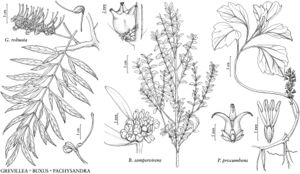Grevillea robusta
Suppl. Prodr. Fl. Nov. Holl., 24. 1830.
Trees 8–40 m, bark fissured. Leaves 10–34 × 9–15 cm; blade with 11–24 (–31) primary lobes, margins of primary lobes entire or 2–5-lobed, sometimes with tertiary division; ultimate lobes oblong to elliptic or subtriangular, 0.5–5 × 0.2–1 cm, margins slightly recurved, surfaces subsericeous to subvillous abaxially, glabrous adaxially. Inflorescences erect, sometimes on relatively short, lateral leafy shoots; branches 24–154-flowered, secund, acropetal, 12–16 cm. Pedicels 7.5–16 mm. Flowers acroscopic; receptacle oblique; perianth usually golden yellow to orange, rarely reddish, sometimes with red blotches inside, glabrous; pistil 21–29 mm, glabrous; ovary stipitate; style yellow-orange; pollen presenter erect, conical. Follicles compressed, ellipsoidal to ovoid, 12–16 mm, glabrous. Seeds compressed, 8–12 × 4–6 mm.
Phenology: Flowering Mar–Jul.
Habitat: Disturbed sites.
Elevation: 0–100 m.
Distribution
Introduced; Calif., Fla., Australia, also in West Indies, s Africa, Pacific Islands
Discussion
Grevillea robusta is native to the coast and coastal ranges of southeastern Queensland and northeastern New South Wales, Australia. The plants usually grow in basaltic soils in three distinct habitats: riverine gallery rainforest and rainforest margins; riverine sclerophyll communities with Casuarina cunninghamiana; and Araucaria forest and vine thickets on higher slopes.
Grevillea robusta is cultivated as an ornamental for its fernlike foliage and spectacular, bird-attracting flowers, in agroforestry for timber and firewood, and as a shade tree in tea and coffee plantations (C. E. Harwood 1989, 1992). Some people have been reported to develop acute contact dermatitis after being exposed to sawdust of G. robusta (J. G. B. Derraik and M. Rademaker 2009).
Selected References
None.
